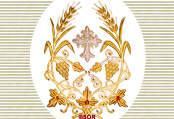
 |
|
||
| Mor Yacqub Burdcono (c. 500-578) |
|
Mor Yacqub Burdcono (c. 500-578) is one of the greatest church fathers, renowned for his godliness and piety. He was among the greatest fighters for the cause of the true faith. Mor Yacqub was born in Tella (or Tell Mawzalt, near Mardin, today called Wayran Shahr) to a priest named Theophilus Bar Ma`nu. While quite young he became a monk at the Monastery of Phsilta in the neighborhood of his homeland. At this monastery he mastered the Syriac and Greek languages and was immersed in religious books and theological science as well as asceticism. Mor Yacqub lived during one of the harshest periods of the Syriac Church. After the Church refused the Chalcedonian formula of faith, it came under the oppression of the Byzantine emperors. Its Patriarch sent to exile and its bishops jailed, there was no one to serve the faithful. In 528, he journeyed to Constantinople, where he was consecrated a metropolitan for Edessa, Syria and Asia, by the laying of the hands of Theodosius, Patriarch of Alexandria in 543 (or as has also been related, in 544), at the request of the Arab Ghassanid king al-Harith Ibn Jabalah al-Ghassani (who belonged to the Syriac Church) and the Empress Theodora. Then he went to Alexandria and with the assistance of some of the bishops, consecrated two bishops. From Alexandria, he traveled incognito into Syria, Armenia, Cappadocia, Cilicia, Isauria, Pamphilia, Lycaonia, Lycia, Phrygia, Cana, Asia Minor and the islands of Cyprus, Rhodes, Chios, and Mitylene and also into Mesopotamia, Persia, and Alexandria, instructing and encouraging the orthodox believers. Authorized by the Patriarch, he consecrated twenty-seven bishops and ordained a few thousand deacons and priests, not forgetting to return quite a few times to his monastery. His disguise as a beggar gave rise to the Syriac epithet burdcono "of the saddle cloth". He continued this work for thirty-five years, indefatigably fighting the good fight for the Church of God, which he supported in the time of adversity until he died at the Monastery of Romanus or the Monastery of Cassian on July 30, 578 and was commemorated by the church. According to a short account by Quryaqos, bishop of Mardin, his remains were kept at the Monastery of Cassian in the confines of Egypt until A. Gr. 933 (A.D. 622), when they were translated to his monastery of Phsilta, near Tell Mawzalt. It was after Mor Yacqub that the Syriac Orthodox were oppropriously nicknamed "Jacobites" by their enemies. The Syriac Orthodox Church rejects this name as Mor Yacqub is not the founder of the Church, but one of its greatest Fathers. Mor Yacqub wrote an anaphora in fifteen pages beginning with “O Lord, the most holy Father of peace” and several letters, four of which were published in the Syriac Documents—three addressed to John of Ephesus and others, and a general letter to the bishops and priests which is mentioned in his lengthy biography. His feast is celebrated on July 30th. Sources: Barsoum, Patr. Aphrem I, The Scattered Pearls, Gorgias Press, 2003. The Oxford Dictionary of the Christian Church (1997). Related Links:
Encyclical from Patriarch Mor Ignatius Zakka I on the 1500th anniversary of birth of Mor Yacqub Burdcono. |
| Copyright © Syriac Orthodox Resources. All Rights Reserved. |
| Last Update: November 22, 2003 |